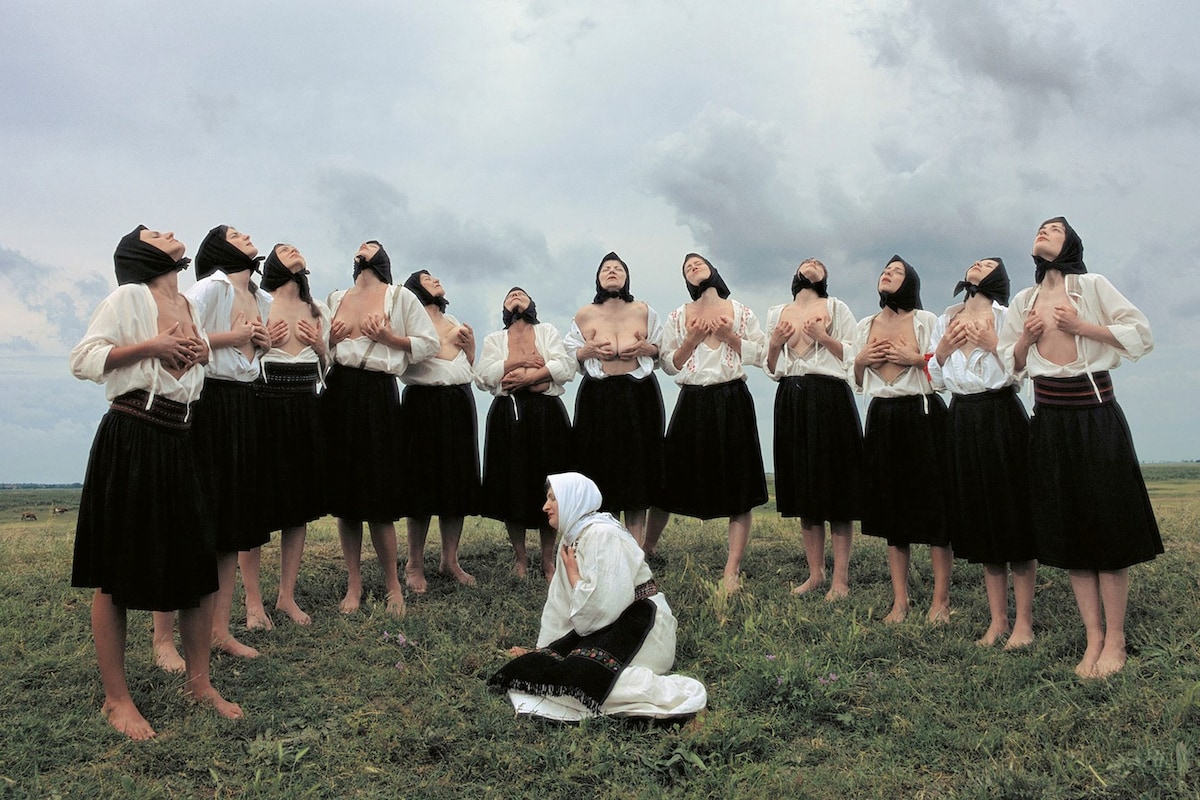
Rewrite
Lead ImageMarina Abramović, Women Massaging Breasts, from the video work Balkan Erotic Epic, Serbia, 2005© Marina Abramović. Courtesy of the Marina Abramović Archives
This October the artist reconceptualises her 2005 video work Balkan Erotic Epic as a four-hour immersive performance with more than 75 participants and an all-new video at Aviva Studios in Manchester. Exploring the raw and erotic power of Balkan folklore – as well as our own political boundaries – Abramović reclaims the body as a site of creativity and joy.
SOPHIE BEW: So, how is the preparation going in Manchester for Balkan Erotic Epic?
MARINA ABRAMOVIĆ: It’s going very well – we’ve sold almost half the tickets and it’s only the beginning of July and the show is in October. I think after the Leigh Bowery show at the Tate Modern, people became more flexible to this kind of world, to something different, involved – things that are not politically correct today. So this work has a chance.
SB: You think the Leigh Bowery show made that much of an impact?
MA: Yes. I was imagining the reaction to be much wilder because when I did my show at the Royal Academy, there was such a riot about the two nude people. So I was thinking the British can never handle nudity.
With this new show I want to focus on all the negative criticism – there is going to be so much. I love the tabloid press for this because I want to prove the point that people can’t see the old rituals without shitting on them. Every single ritual that I’ve chosen to show in this work is real – it’s not invented by me. They exist from the 4th, 5th, 10th, 11th and 12th centuries. For centuries we’ve used vaginas and phalluses to connect with the gods. My main statement is it’s not pornography, it’s humanity. This is important. And especially in British culture, where everything you say is edited – even the title of this work: instead of Balkan Erotic Epic they wanted it to say Er*tic, with a little star instead of the o.
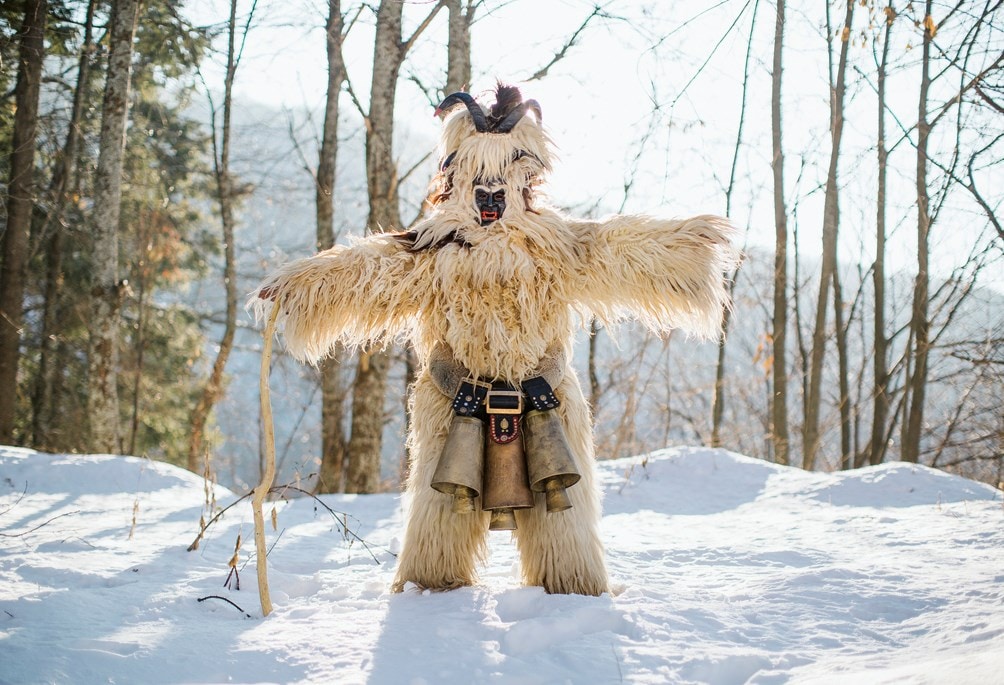
SB: Really?
MA: It’s why this piece is so important to me. Firstly, this is one of the biggest pieces I’ve ever made in my life – there are more than 75 people participating. It’s just huge. And secondly, I’ve never been back to my Slavic roots so intensely. Next year I will be 80 years old and it’s so important to talk about sex and the erotic because women stop thinking they exist after menopause.
Erotic energy is so essential – especially at this time of destruction, violence, war and political mess – sexual energy is the only energy we have in our body. It’s the energy of reproduction and human existence. How can this energy be channelled to creativity, to love, to tenderness, as well as virus or aggression? The idea is to look at the roots of that energy and where we are with this energy now. Now it’s just all about hate, aggression, violence. But I wanted to show that there are other possibilities.
SB: How does it compare to when you made the Balkan Erotic Epic video originally in 2005? How does it feel looking at the film now? What’s changed?
MA: It’s great because that was the video I could make at that time – I never even dreamed that I could make it live, that it could become live. It took me all these years to have the courage to do it – right now I don’t give a shit what anybody says. I know that I’m on the right path. I know that what I want to say is so important in this moment of human history. I have this complete confidence that this piece is essential.
SB: And has censorship changed since then, when you first made the film?
MA: It’s worse. Much worse. At that time this movie was OK. People didn’t react. But this political correctness breaks creativity completely. I’ve always said that the history of performance art, that flux that was happening from the time of the early 1970s, would never be possible now.
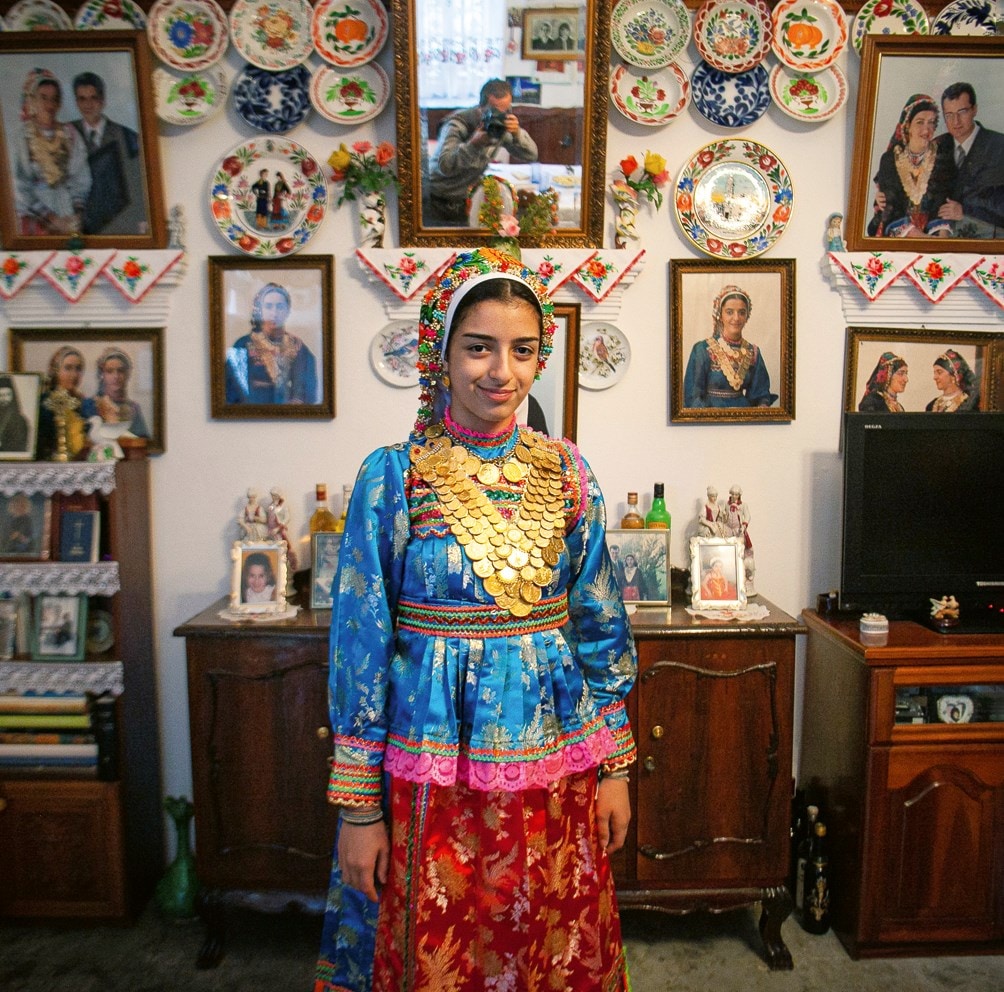
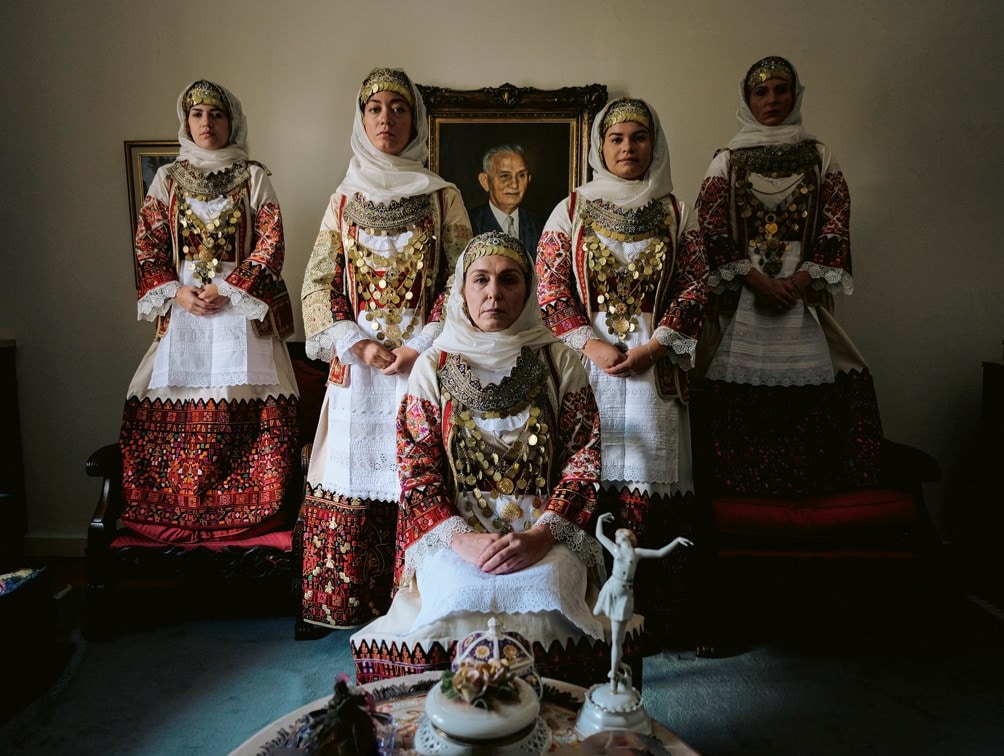
SB: Why do you think that is?
MA: I don’t know. Because we are fucked up. Politics. Look at our governments, look who’s running the countries. I mean the answer is everywhere. Also, the public. There’s no rebel. I mean, look at the time of Vivienne Westwood – where is this person now?
SB: I really felt that seeing the Leigh Bowery show. I remember thinking, who is that now? Maybe it’s you, Marina?
MA: It’s nobody. It’s incredible. This is why Leigh Bowery was so fresh in British culture. I worked with Leigh Bowery once – he made me a rat queen costume [for the performance piece Delusional (1994), which featured 400 live rats]. He was such an original human, very important. He created an entire world in club culture – the influence he had later was incredible. He was a very special human being. He investigated one thing in art that is so difficult – shame. He was doing shameful things. And you were ashamed for looking at him, and that’s an incredibly interesting sensation. People don’t like to bring shame on themselves. They don’t like to expose shame, they don’t work with it. He was so courageous.
SB: Absolutely. So what made you come back to the Balkan Erotic Epic right now?
MA: Because I think it’s the right time. But also I’m at the age where I can say much more profound things, I can formulate them now. You need wisdom, which only comes with old age, my dear. I never want to be 20, 30, 40 – it was a really shitty period. I suffered so much for stupid reasons. The bullshit relationships, the man that I wanted to change that I couldn’t – and all these emotions, emotions, emotions. But now I see all this, I see mistakes. I have so much focus and enjoy life much more. I see the humour, I see the possibility to really say something profound with humour. When you see this piece you will laugh, you will cry, you’ll be angry, but you will definitely be emotional.
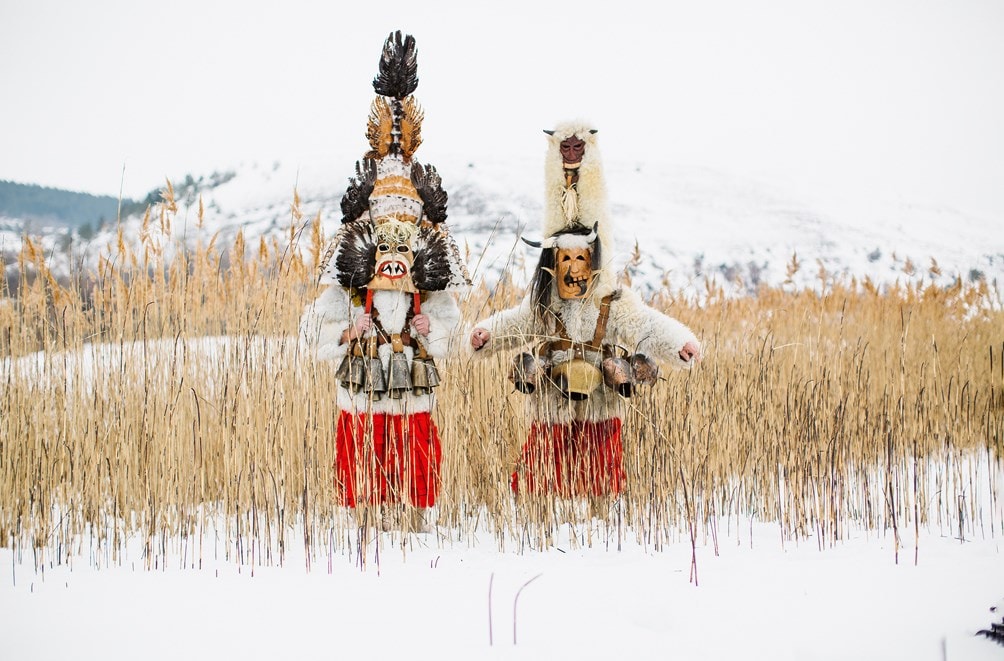
SB: How is it going to work, the experience at Aviva Studios?
MA: First of all it is absolutely radical, uncompromised, with 14 stages all in one space. This is only possible in three spaces in the world – Aviva in Manchester, which has this factory space that can host 5,000 people. There is Ruhrtriennale [the arts festival held in the Ruhr area, west Germany] and then there is Park Avenue Armory, New York, which also has this kind of space. Everywhere else we will have to make a compromised version [for when the show tours] – there will be stage versions for theatres in different countries, where we will go scene by scene and it will be a two-hour experience. Here [in Manchester], in the large, uncompromised stage, we will go for four hours.
First, in the factory you have a big, big, hole. In this big hole you’ll find me standing there, and I’ll tell you a little introduction about the Balkan Erotic Epic. Then we have the brass orchestra, which will start with funeral music and will lead you into the space. The space is divided into 14 stages. The entire stage is covered in black grass – we want to avoid the idea of the white cube.
So, when you enter, you are facing a very large, ten-metre screen and podium. On the screen we have 50 women dressed in black with the black scarves, mourning the Tito funeral [the popular president of the former Yugoslavia died in 1980]. Tito’s funeral was the beginning of a very erotic experience for me, because all the women in sorrow for his death beat their chests, opened their blouses, showed their naked breasts and cried, “Why did you choose him and not me?”
Who is choosing – God? It was complete confusion and insanity – we are atheist because we are communist – and you could only hear this beating, beating, beating, constantly. In front of that is a woman in an enormous black dress by Roksanda Ilinčić – she’s our costume designer – the woman singing the mourning Tito hymn. And Tito is presented with a photograph next to an empty uniform, with all the medals, empty socks, empty shoes, just standing on a shelf. And from this image you can make your journey wherever you want. Go to different stages – everything’s happening at the same time. When you get tired, you go out, you have a drink, you come back.
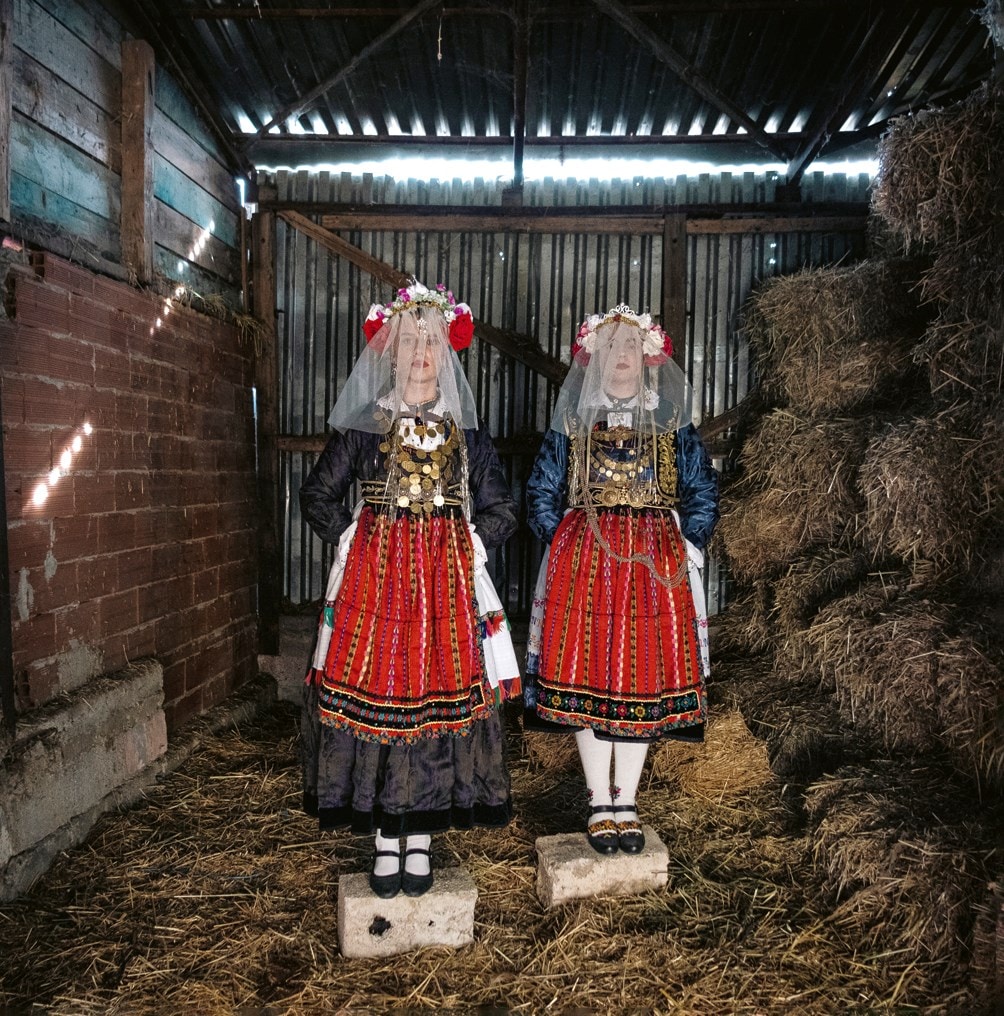
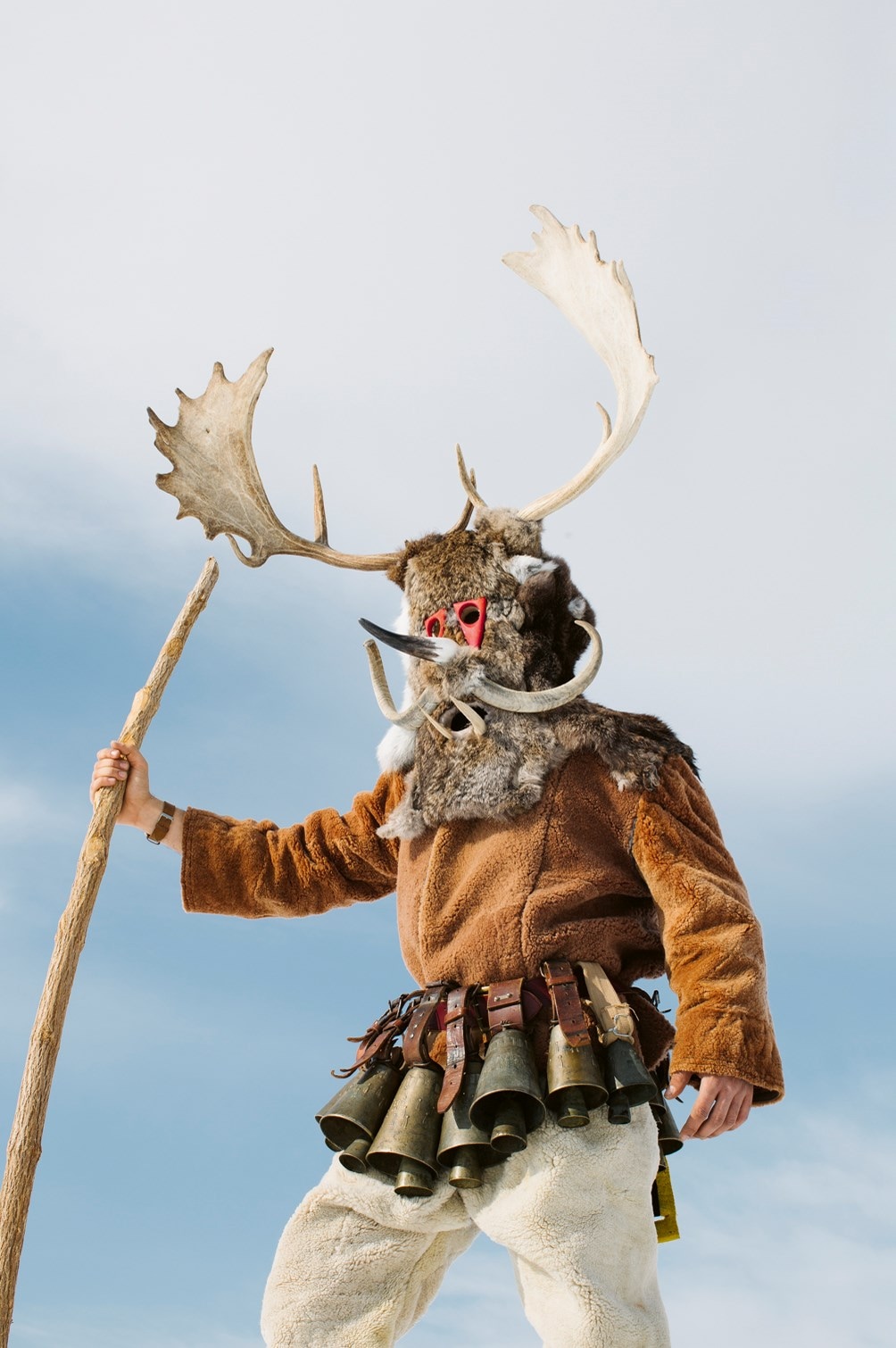
So, the procession is four hours long – all the participants are in one position, they stay in that position, doing what they’re doing. Before long you’ll see their energy going down, you see exhaustion and you see everything falling apart. When it’s falling apart, the brass orchestra starts playing the wedding music – all happiness. A complete contrast to the funeral when you arrive. And then with this happiness, after four hours, the public goes out.
But in the meantime, there are many different things. In one space, you will see an entire garden of phallic mushrooms – some are three, four, six metres high, and there’s a back projection of a penis forest. In front of this is a Flemish scientist who came to the Balkans to study Balkan magic. She’s sitting under one of the penises and four times during the show she will stand up and recite a magic potion. The magic potions are insane. They’re all real, but at the same time they could never be accepted in our society. There’s one to stop your lover or husband leaving you, one to keep your child from getting sick. There’s one to facilitate painless childbirth – the man has to kneel in front of the pregnant woman with an erect penis and make crosses on her stomach with it.
So we made cartoons of these with Sonia Alcón – I have to mention her name, she’s a fantastic cartoonist. The moment the scientist stands up, all the screens go blank and you see only her and the animation.
SB: Is that why sex is so important? Because it’s integral to everything? To our existence?
MA: It’s not to do with sex only, it’s to do with birth, with death. It’s going to be an orgy on the graveyard. It’s to do with the recreation of new life. It’s to do with mourning, suffering, pain – everything. Everything that’s included in life. It’s human life. We are born and then we die. And there’s everything between.
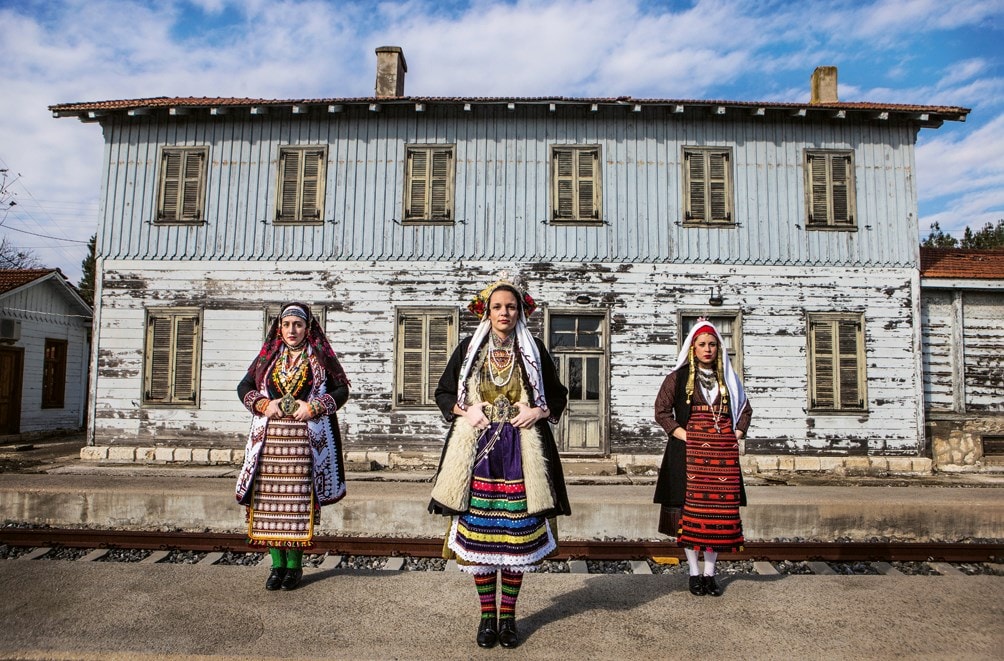
SB: And how was birth, death, sex talked about when you were growing up?
MA: My mother never talked about sex. It was forbidden in the house. I lost my virginity when I was 24. So sex was taboo. And so I had to discover everything myself much later. All these rituals I just described, I studied myself. No one talked about that in my house. I had a very strict education, incredible, military discipline in my home. When I was 29 I still had to come home at ten o’clock. So probably that total taboo on sex really made me study where everything went wrong. What is it about sex?
SB: Where did everything go wrong?
MA: Everything went wrong because we lost it. If you see the younger generation, they don’t have emotional contact – it’s frightening. They’ll send messages to each other but they will not see each other. They will not kiss. I mean we are in real trouble right now as humanity. Emotions are completely cut off. They don’t want you to be emotional because they don’t want to feel pain and suffering. Love is about suffering – you love, you lose, you love again. They just fight to be cut off. This is why it’s important to break taboos and to look into the past. How was the past? And why are we so unbelievably fucked up right now?
SB: Folk song seems to be an important part of looking back – apart from the funeral and wedding songs, what part will music play in all of this?
MA: I have Marko Nikodijević and Luka Kozlovački, they’re both from my country. One is a modern composer and one is electronic. They both make a mix of electronic and brass music. We recorded some choruses from the throat singing in our country and then we made the music. So there will be a live orchestra but also some electronic music to cover the rest of the space. And some voices are wonderful haunting female voices. Especially the orgy funeral piece – there are 14 male and female performers together, each with a skeleton, in a slow-motion movement on the graveyard. I’m so excited about the world, I can’t even tell you. Because I just finished the 7 Deaths of Maria Callas opera, which is a totally different story, very minimal, very, very clean. This is like hell – like the Balkans.
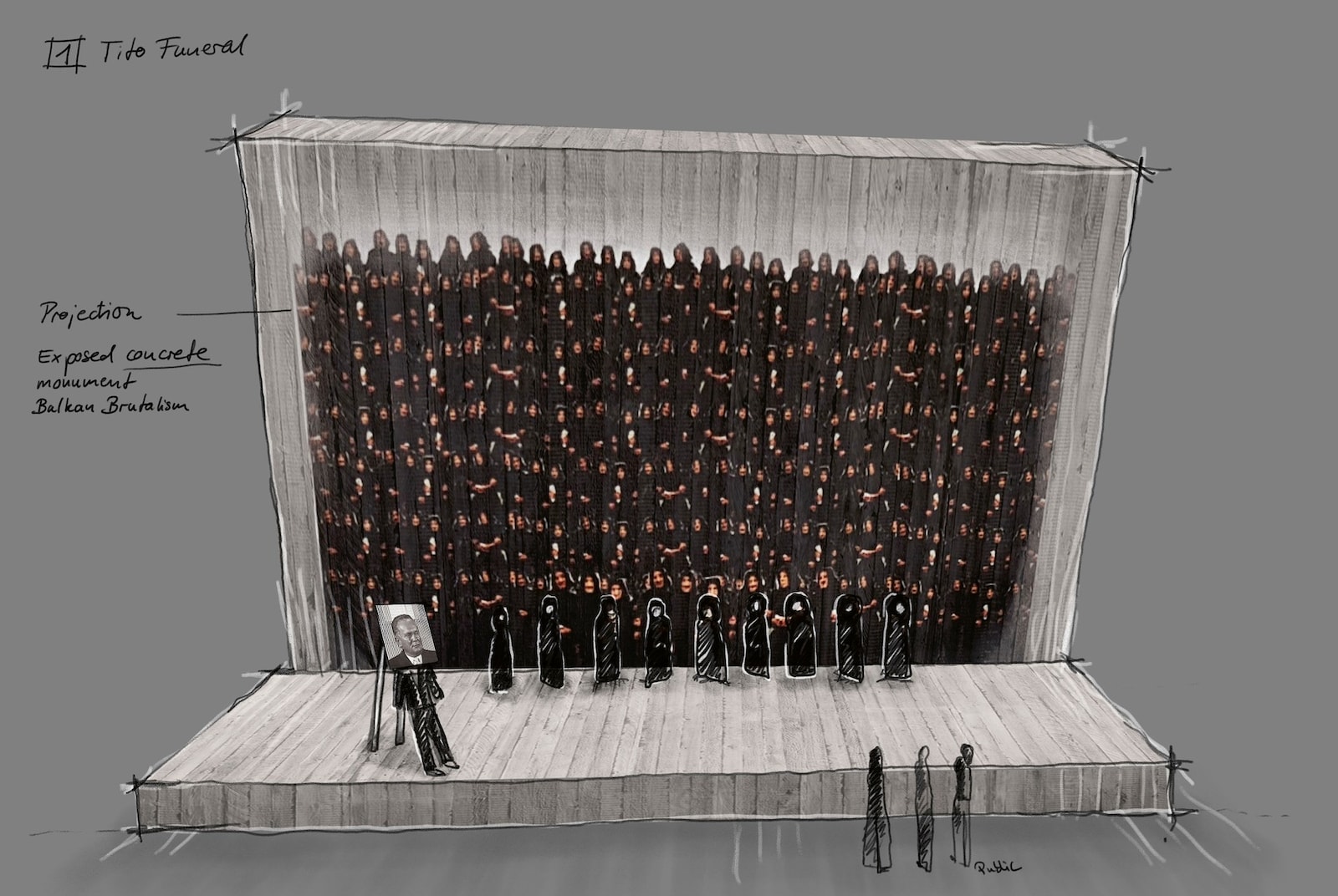
SB: The 7 Deaths of Maria Callas was wonderful.
MA: I had so much success with the young audience coming that, afterwards, every opera house asked me if I can make them a new opera. I’m totally not interested because one is enough. And now I’m doing something so different. You put me in the box, I just jump. I’m also doing something with Hans Ulrich [Obrist] with artificial intelligence – I just made my new avatar. Life is going on. I’m curious. I had this one quite famous director – I won’t say his name – say, “Can we make a film about your 80th birthday?” I said to him, “I can’t, it’s too early. Let’s make it when I’m 90.” He sent me this beautiful letter, saying, “Marina, nobody ever refused an 80th party.” He said, “How do you do this? I’m 52 and I feel so old already.” I said, “I don’t know – 80 is the new 40, come on.”
SB: Well, endurance is your thing, right?
MA: And from September, I’ll be there [in Manchester] for two months. I’m arriving on the 1st of September and we are filming, filming, filming. And then we have to edit everything, because in just two months we will have all the elements separate and we will put it all together into one huge installation. Also, importantly, the public will be able to come into the space during the day and watch the entire videos without the performers. So they can see it as a real installation and then in the evening they can see it all in action.
SB: I like the idea of the video almost being made live together with the performance, rather than separate, in advance.
MA: It’s incredibly stressful because we have to make it all together, it’s kind of insane. But it is very important to me that all the rituals, all the cartoons, everything is based on real stories. I didn’t invent anything. I just kind of revisit history and give it to you to see. And if we criticise old cultures, then where are we as humans?
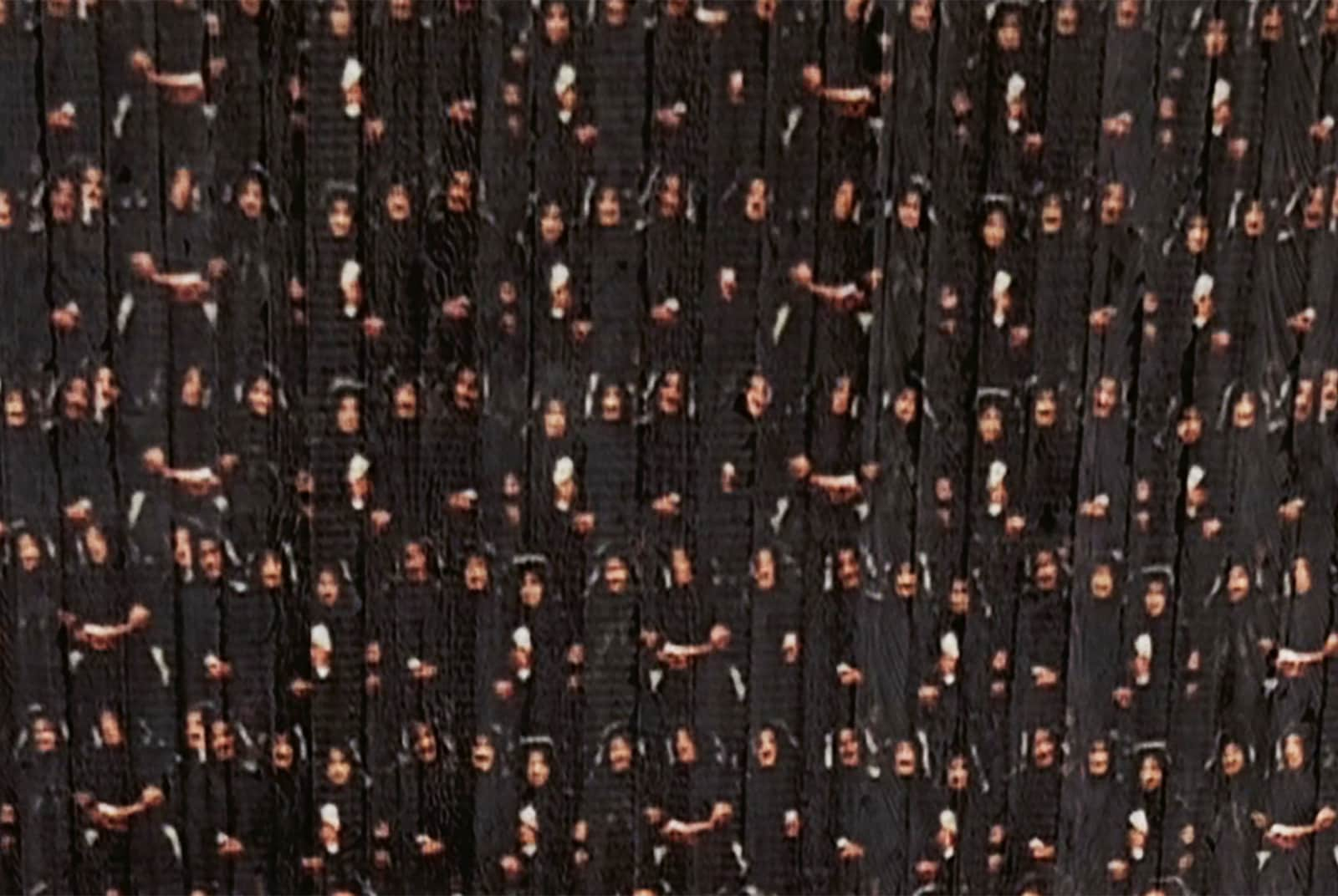
SB: Why do you think that is so important? Because we move on and we change, don’t we? Why is it a problem to look back and revile the past?
MA: Because we’ve forgotten the simple things. We’ve forgotten the connection to our body, to our soul, to our sexuality, to our emotions. And I think it’s so important, especially for young generations, to see something they have no knowledge of. I think that’s good for them. This will wake them up somehow.
SB: That’s been integral to your practice for ever, hasn’t it? That presence inside the body.
MA: When I did the performance at Serpentine Galleries in 2014, 512 Hours, there was a 12-year-old kid. When you entered the space, you had to give your telephone, watch, computer over and put it in the locker, and you got given a pair of sound-block headphones. The kid got the headphones and said, “But they don’t work.” I said, “Of course they don’t work – they are to make silence.” He was unbelievably shocked – he’d never heard of the idea of silence, because he’s always got something to hear. So he brought me the entire class the next day, all kids from his school, to listen to the silence. This was a huge achievement for me. So I feel like I’m doing a pioneering job around here.
SB: You absolutely are.
MA: Another thing I’m very personally proud of is, at Glastonbury last year, I got the crowds to stand in seven minutes of silence – 275,000 people standing in the front of the Pyramid Stage. And I asked people who drink, take drugs, take mushrooms all day long and go there to listen to music to be silent. And they did it.
SB: What does it give you, the silence, being present in that way? Why is it so important?
MA: I just want to show people that’s the only reality we have, because we always look into the past that’s happened, or project the future that hasn’t, and we don’t live in the moment. And the moment is the only reality we have, because an asteroid can come and destroy the entire planet at any second. You never know. Presence is the only thing we have.
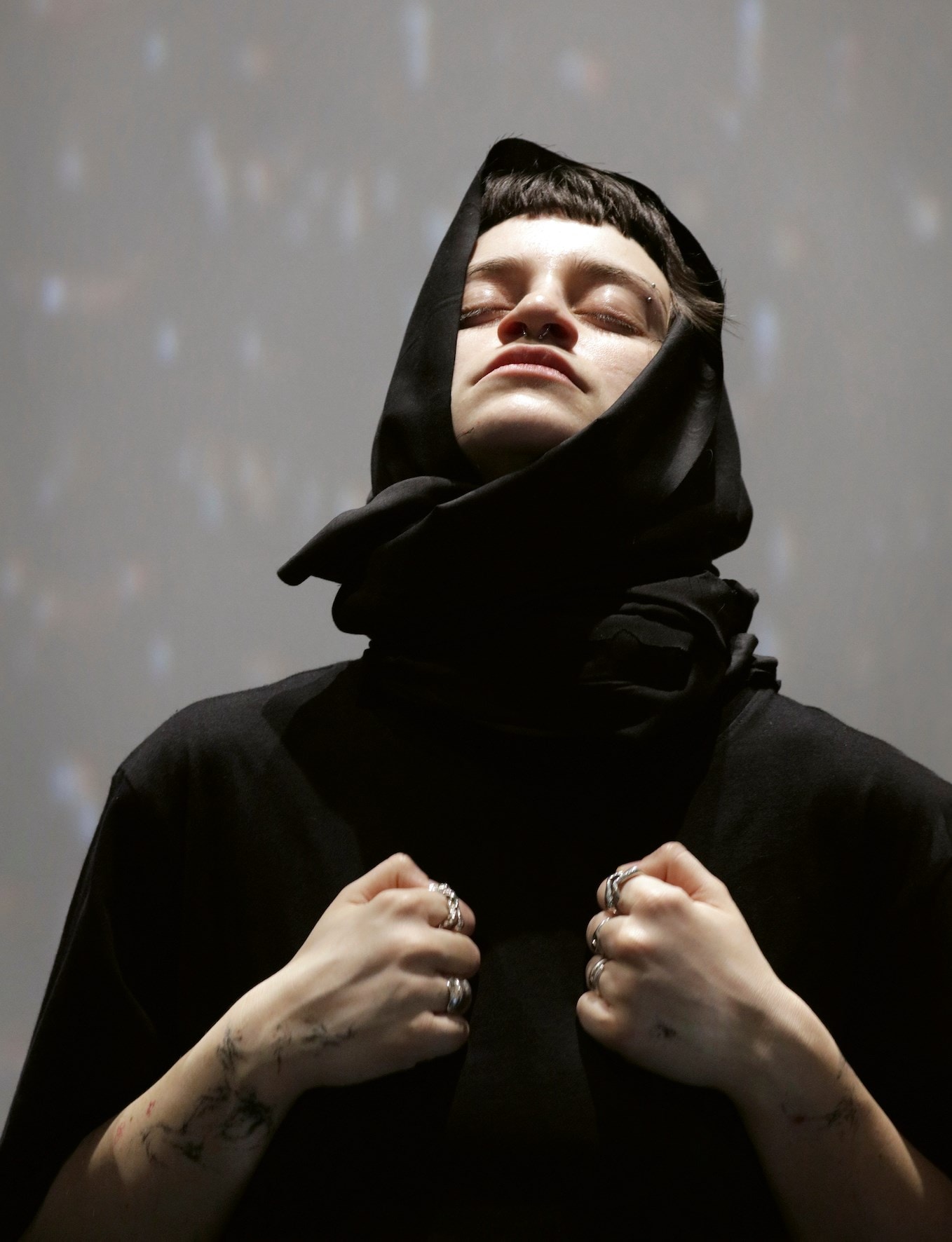
So to really be in presence, you also understand that time doesn’t exist in the present because you are here and now. Plus, in your here and now, you do everything properly because, yes, I’m coughing and I had to go to get water, but when I do this interview I’m nowhere else. I’m just here with you and that’s it. We tend to look at our telephones 20 times, think about millions of things at the same time, so you miss the present constantly. My teaching is to lift the human spirit, to teach them to be in the present. It took me 55 years to get to this knowledge. Something like this takes a little time.
SB: So how do you deal with that? Do you not use a mobile phone?
MA: Right now, because I’m working so much – I have four interviews today, I started at 8am – I have a couple more and then I just switch off the telephone and computer. I don’t watch movies, read books, walk. I do the talks using technology and I also teach the opposite. We are addicted to technology. Technology is supposed to give us a place to have more time but it’s bullshit, we just have more and more technology. Humans don’t know what to do with the free time, that’s another problem. To really live with yourself with doing nothing.
I’ll give you an example. One day, do what I tell you now and just see what happens. Let’s say tomorrow is Sunday – you wake up in the morning very fresh and you’re full of energy and you want to go jogging. You want to do this, you want to do that, you’re going to shop, you’re going to call friends for dinner, or whatever. What if you did absolutely nothing? You wake up with all this energy, you switch your telephone off, your computer, switch everything off. Find a nice little chair in the garden, or next to the window, and just sit. Don’t listen to music, don’t read. Just sit in silence on the chair for one hour and then see what happens with that energy.
It’s incredible – that energy you want to expend, that [usually] by the end of the day you’ve exhausted, instead this energy goes back inside, nourishes you and you start thinking about important problems and questions about your life. Are you on the right path? If I’m doing this right, what I can do better? Why am I doing what I’m doing? I’m actually unhappy with my life. You have time to do that if you do nothing. Nothing is the beginning of something. Wow, this is big wisdom.
SB: Really big wisdom – I can’t even imagine doing that for an hour.
MA: It’s such a simple exercise, but it’s like, wow, why didn’t I do it earlier?
SB: So, with Balkan Erotic Epic, you’ve arrived at this combination of being present and in the moment with looking backwards at collective memory and ancient wisdom. How do those two things work together at the same time?
MA: You have to tell me when you see the piece, really. Perhaps the answer is it will help you reach a high emotional level. You’ll laugh, you’ll be amused, you’ll be angry and you’ll be disturbed all together.
Marina Abramović: Balkan Erotic Epic runs at Aviva Studios, Manchester, from 9 to 19 October.
Director: Marina Abramović. Composer: Marko Nikodijević. Sound designer: Luka Kozlovački. Costume designer: Roksanda Ilinčić. Set designer: Anna Schöttl. Choreographer: Blenard Azizaj. Lighting designer: Urs Schönebaum. Associate director: Georgine Maria-Magdalena Balk. Film director: Nabil Elderkin. Animation: Sonia Alcón. Commissioning: Factory International, Berliner Festspiele, Gran Teatre del Liceu, Park Avenue Armory and WestK. Production: Factory International
in HTML format, including tags, to make it appealing and easy to read for Japanese-speaking readers aged 20 to 40 interested in fashion. Organize the content with appropriate headings and subheadings (h1, h2, h3, h4, h5, h6), translating all text, including headings, into Japanese. Retain any existing
tags from
Lead ImageMarina Abramović, Women Massaging Breasts, from the video work Balkan Erotic Epic, Serbia, 2005© Marina Abramović. Courtesy of the Marina Abramović Archives
This October the artist reconceptualises her 2005 video work Balkan Erotic Epic as a four-hour immersive performance with more than 75 participants and an all-new video at Aviva Studios in Manchester. Exploring the raw and erotic power of Balkan folklore – as well as our own political boundaries – Abramović reclaims the body as a site of creativity and joy.
SOPHIE BEW: So, how is the preparation going in Manchester for Balkan Erotic Epic?
MARINA ABRAMOVIĆ: It’s going very well – we’ve sold almost half the tickets and it’s only the beginning of July and the show is in October. I think after the Leigh Bowery show at the Tate Modern, people became more flexible to this kind of world, to something different, involved – things that are not politically correct today. So this work has a chance.
SB: You think the Leigh Bowery show made that much of an impact?
MA: Yes. I was imagining the reaction to be much wilder because when I did my show at the Royal Academy, there was such a riot about the two nude people. So I was thinking the British can never handle nudity.
With this new show I want to focus on all the negative criticism – there is going to be so much. I love the tabloid press for this because I want to prove the point that people can’t see the old rituals without shitting on them. Every single ritual that I’ve chosen to show in this work is real – it’s not invented by me. They exist from the 4th, 5th, 10th, 11th and 12th centuries. For centuries we’ve used vaginas and phalluses to connect with the gods. My main statement is it’s not pornography, it’s humanity. This is important. And especially in British culture, where everything you say is edited – even the title of this work: instead of Balkan Erotic Epic they wanted it to say Er*tic, with a little star instead of the o.

SB: Really?
MA: It’s why this piece is so important to me. Firstly, this is one of the biggest pieces I’ve ever made in my life – there are more than 75 people participating. It’s just huge. And secondly, I’ve never been back to my Slavic roots so intensely. Next year I will be 80 years old and it’s so important to talk about sex and the erotic because women stop thinking they exist after menopause.
Erotic energy is so essential – especially at this time of destruction, violence, war and political mess – sexual energy is the only energy we have in our body. It’s the energy of reproduction and human existence. How can this energy be channelled to creativity, to love, to tenderness, as well as virus or aggression? The idea is to look at the roots of that energy and where we are with this energy now. Now it’s just all about hate, aggression, violence. But I wanted to show that there are other possibilities.
SB: How does it compare to when you made the Balkan Erotic Epic video originally in 2005? How does it feel looking at the film now? What’s changed?
MA: It’s great because that was the video I could make at that time – I never even dreamed that I could make it live, that it could become live. It took me all these years to have the courage to do it – right now I don’t give a shit what anybody says. I know that I’m on the right path. I know that what I want to say is so important in this moment of human history. I have this complete confidence that this piece is essential.
SB: And has censorship changed since then, when you first made the film?
MA: It’s worse. Much worse. At that time this movie was OK. People didn’t react. But this political correctness breaks creativity completely. I’ve always said that the history of performance art, that flux that was happening from the time of the early 1970s, would never be possible now.


SB: Why do you think that is?
MA: I don’t know. Because we are fucked up. Politics. Look at our governments, look who’s running the countries. I mean the answer is everywhere. Also, the public. There’s no rebel. I mean, look at the time of Vivienne Westwood – where is this person now?
SB: I really felt that seeing the Leigh Bowery show. I remember thinking, who is that now? Maybe it’s you, Marina?
MA: It’s nobody. It’s incredible. This is why Leigh Bowery was so fresh in British culture. I worked with Leigh Bowery once – he made me a rat queen costume [for the performance piece Delusional (1994), which featured 400 live rats]. He was such an original human, very important. He created an entire world in club culture – the influence he had later was incredible. He was a very special human being. He investigated one thing in art that is so difficult – shame. He was doing shameful things. And you were ashamed for looking at him, and that’s an incredibly interesting sensation. People don’t like to bring shame on themselves. They don’t like to expose shame, they don’t work with it. He was so courageous.
SB: Absolutely. So what made you come back to the Balkan Erotic Epic right now?
MA: Because I think it’s the right time. But also I’m at the age where I can say much more profound things, I can formulate them now. You need wisdom, which only comes with old age, my dear. I never want to be 20, 30, 40 – it was a really shitty period. I suffered so much for stupid reasons. The bullshit relationships, the man that I wanted to change that I couldn’t – and all these emotions, emotions, emotions. But now I see all this, I see mistakes. I have so much focus and enjoy life much more. I see the humour, I see the possibility to really say something profound with humour. When you see this piece you will laugh, you will cry, you’ll be angry, but you will definitely be emotional.

SB: How is it going to work, the experience at Aviva Studios?
MA: First of all it is absolutely radical, uncompromised, with 14 stages all in one space. This is only possible in three spaces in the world – Aviva in Manchester, which has this factory space that can host 5,000 people. There is Ruhrtriennale [the arts festival held in the Ruhr area, west Germany] and then there is Park Avenue Armory, New York, which also has this kind of space. Everywhere else we will have to make a compromised version [for when the show tours] – there will be stage versions for theatres in different countries, where we will go scene by scene and it will be a two-hour experience. Here [in Manchester], in the large, uncompromised stage, we will go for four hours.
First, in the factory you have a big, big, hole. In this big hole you’ll find me standing there, and I’ll tell you a little introduction about the Balkan Erotic Epic. Then we have the brass orchestra, which will start with funeral music and will lead you into the space. The space is divided into 14 stages. The entire stage is covered in black grass – we want to avoid the idea of the white cube.
So, when you enter, you are facing a very large, ten-metre screen and podium. On the screen we have 50 women dressed in black with the black scarves, mourning the Tito funeral [the popular president of the former Yugoslavia died in 1980]. Tito’s funeral was the beginning of a very erotic experience for me, because all the women in sorrow for his death beat their chests, opened their blouses, showed their naked breasts and cried, “Why did you choose him and not me?”
Who is choosing – God? It was complete confusion and insanity – we are atheist because we are communist – and you could only hear this beating, beating, beating, constantly. In front of that is a woman in an enormous black dress by Roksanda Ilinčić – she’s our costume designer – the woman singing the mourning Tito hymn. And Tito is presented with a photograph next to an empty uniform, with all the medals, empty socks, empty shoes, just standing on a shelf. And from this image you can make your journey wherever you want. Go to different stages – everything’s happening at the same time. When you get tired, you go out, you have a drink, you come back.


So, the procession is four hours long – all the participants are in one position, they stay in that position, doing what they’re doing. Before long you’ll see their energy going down, you see exhaustion and you see everything falling apart. When it’s falling apart, the brass orchestra starts playing the wedding music – all happiness. A complete contrast to the funeral when you arrive. And then with this happiness, after four hours, the public goes out.
But in the meantime, there are many different things. In one space, you will see an entire garden of phallic mushrooms – some are three, four, six metres high, and there’s a back projection of a penis forest. In front of this is a Flemish scientist who came to the Balkans to study Balkan magic. She’s sitting under one of the penises and four times during the show she will stand up and recite a magic potion. The magic potions are insane. They’re all real, but at the same time they could never be accepted in our society. There’s one to stop your lover or husband leaving you, one to keep your child from getting sick. There’s one to facilitate painless childbirth – the man has to kneel in front of the pregnant woman with an erect penis and make crosses on her stomach with it.
So we made cartoons of these with Sonia Alcón – I have to mention her name, she’s a fantastic cartoonist. The moment the scientist stands up, all the screens go blank and you see only her and the animation.
SB: Is that why sex is so important? Because it’s integral to everything? To our existence?
MA: It’s not to do with sex only, it’s to do with birth, with death. It’s going to be an orgy on the graveyard. It’s to do with the recreation of new life. It’s to do with mourning, suffering, pain – everything. Everything that’s included in life. It’s human life. We are born and then we die. And there’s everything between.

SB: And how was birth, death, sex talked about when you were growing up?
MA: My mother never talked about sex. It was forbidden in the house. I lost my virginity when I was 24. So sex was taboo. And so I had to discover everything myself much later. All these rituals I just described, I studied myself. No one talked about that in my house. I had a very strict education, incredible, military discipline in my home. When I was 29 I still had to come home at ten o’clock. So probably that total taboo on sex really made me study where everything went wrong. What is it about sex?
SB: Where did everything go wrong?
MA: Everything went wrong because we lost it. If you see the younger generation, they don’t have emotional contact – it’s frightening. They’ll send messages to each other but they will not see each other. They will not kiss. I mean we are in real trouble right now as humanity. Emotions are completely cut off. They don’t want you to be emotional because they don’t want to feel pain and suffering. Love is about suffering – you love, you lose, you love again. They just fight to be cut off. This is why it’s important to break taboos and to look into the past. How was the past? And why are we so unbelievably fucked up right now?
SB: Folk song seems to be an important part of looking back – apart from the funeral and wedding songs, what part will music play in all of this?
MA: I have Marko Nikodijević and Luka Kozlovački, they’re both from my country. One is a modern composer and one is electronic. They both make a mix of electronic and brass music. We recorded some choruses from the throat singing in our country and then we made the music. So there will be a live orchestra but also some electronic music to cover the rest of the space. And some voices are wonderful haunting female voices. Especially the orgy funeral piece – there are 14 male and female performers together, each with a skeleton, in a slow-motion movement on the graveyard. I’m so excited about the world, I can’t even tell you. Because I just finished the 7 Deaths of Maria Callas opera, which is a totally different story, very minimal, very, very clean. This is like hell – like the Balkans.

SB: The 7 Deaths of Maria Callas was wonderful.
MA: I had so much success with the young audience coming that, afterwards, every opera house asked me if I can make them a new opera. I’m totally not interested because one is enough. And now I’m doing something so different. You put me in the box, I just jump. I’m also doing something with Hans Ulrich [Obrist] with artificial intelligence – I just made my new avatar. Life is going on. I’m curious. I had this one quite famous director – I won’t say his name – say, “Can we make a film about your 80th birthday?” I said to him, “I can’t, it’s too early. Let’s make it when I’m 90.” He sent me this beautiful letter, saying, “Marina, nobody ever refused an 80th party.” He said, “How do you do this? I’m 52 and I feel so old already.” I said, “I don’t know – 80 is the new 40, come on.”
SB: Well, endurance is your thing, right?
MA: And from September, I’ll be there [in Manchester] for two months. I’m arriving on the 1st of September and we are filming, filming, filming. And then we have to edit everything, because in just two months we will have all the elements separate and we will put it all together into one huge installation. Also, importantly, the public will be able to come into the space during the day and watch the entire videos without the performers. So they can see it as a real installation and then in the evening they can see it all in action.
SB: I like the idea of the video almost being made live together with the performance, rather than separate, in advance.
MA: It’s incredibly stressful because we have to make it all together, it’s kind of insane. But it is very important to me that all the rituals, all the cartoons, everything is based on real stories. I didn’t invent anything. I just kind of revisit history and give it to you to see. And if we criticise old cultures, then where are we as humans?

SB: Why do you think that is so important? Because we move on and we change, don’t we? Why is it a problem to look back and revile the past?
MA: Because we’ve forgotten the simple things. We’ve forgotten the connection to our body, to our soul, to our sexuality, to our emotions. And I think it’s so important, especially for young generations, to see something they have no knowledge of. I think that’s good for them. This will wake them up somehow.
SB: That’s been integral to your practice for ever, hasn’t it? That presence inside the body.
MA: When I did the performance at Serpentine Galleries in 2014, 512 Hours, there was a 12-year-old kid. When you entered the space, you had to give your telephone, watch, computer over and put it in the locker, and you got given a pair of sound-block headphones. The kid got the headphones and said, “But they don’t work.” I said, “Of course they don’t work – they are to make silence.” He was unbelievably shocked – he’d never heard of the idea of silence, because he’s always got something to hear. So he brought me the entire class the next day, all kids from his school, to listen to the silence. This was a huge achievement for me. So I feel like I’m doing a pioneering job around here.
SB: You absolutely are.
MA: Another thing I’m very personally proud of is, at Glastonbury last year, I got the crowds to stand in seven minutes of silence – 275,000 people standing in the front of the Pyramid Stage. And I asked people who drink, take drugs, take mushrooms all day long and go there to listen to music to be silent. And they did it.
SB: What does it give you, the silence, being present in that way? Why is it so important?
MA: I just want to show people that’s the only reality we have, because we always look into the past that’s happened, or project the future that hasn’t, and we don’t live in the moment. And the moment is the only reality we have, because an asteroid can come and destroy the entire planet at any second. You never know. Presence is the only thing we have.

So to really be in presence, you also understand that time doesn’t exist in the present because you are here and now. Plus, in your here and now, you do everything properly because, yes, I’m coughing and I had to go to get water, but when I do this interview I’m nowhere else. I’m just here with you and that’s it. We tend to look at our telephones 20 times, think about millions of things at the same time, so you miss the present constantly. My teaching is to lift the human spirit, to teach them to be in the present. It took me 55 years to get to this knowledge. Something like this takes a little time.
SB: So how do you deal with that? Do you not use a mobile phone?
MA: Right now, because I’m working so much – I have four interviews today, I started at 8am – I have a couple more and then I just switch off the telephone and computer. I don’t watch movies, read books, walk. I do the talks using technology and I also teach the opposite. We are addicted to technology. Technology is supposed to give us a place to have more time but it’s bullshit, we just have more and more technology. Humans don’t know what to do with the free time, that’s another problem. To really live with yourself with doing nothing.
I’ll give you an example. One day, do what I tell you now and just see what happens. Let’s say tomorrow is Sunday – you wake up in the morning very fresh and you’re full of energy and you want to go jogging. You want to do this, you want to do that, you’re going to shop, you’re going to call friends for dinner, or whatever. What if you did absolutely nothing? You wake up with all this energy, you switch your telephone off, your computer, switch everything off. Find a nice little chair in the garden, or next to the window, and just sit. Don’t listen to music, don’t read. Just sit in silence on the chair for one hour and then see what happens with that energy.
It’s incredible – that energy you want to expend, that [usually] by the end of the day you’ve exhausted, instead this energy goes back inside, nourishes you and you start thinking about important problems and questions about your life. Are you on the right path? If I’m doing this right, what I can do better? Why am I doing what I’m doing? I’m actually unhappy with my life. You have time to do that if you do nothing. Nothing is the beginning of something. Wow, this is big wisdom.
SB: Really big wisdom – I can’t even imagine doing that for an hour.
MA: It’s such a simple exercise, but it’s like, wow, why didn’t I do it earlier?
SB: So, with Balkan Erotic Epic, you’ve arrived at this combination of being present and in the moment with looking backwards at collective memory and ancient wisdom. How do those two things work together at the same time?
MA: You have to tell me when you see the piece, really. Perhaps the answer is it will help you reach a high emotional level. You’ll laugh, you’ll be amused, you’ll be angry and you’ll be disturbed all together.
Marina Abramović: Balkan Erotic Epic runs at Aviva Studios, Manchester, from 9 to 19 October.
Director: Marina Abramović. Composer: Marko Nikodijević. Sound designer: Luka Kozlovački. Costume designer: Roksanda Ilinčić. Set designer: Anna Schöttl. Choreographer: Blenard Azizaj. Lighting designer: Urs Schönebaum. Associate director: Georgine Maria-Magdalena Balk. Film director: Nabil Elderkin. Animation: Sonia Alcón. Commissioning: Factory International, Berliner Festspiele, Gran Teatre del Liceu, Park Avenue Armory and WestK. Production: Factory International
and integrate them seamlessly into the new content without adding new tags. Ensure the new content is fashion-related, written entirely in Japanese, and approximately 1500 words. Conclude with a “結論” section and a well-formatted “よくある質問” section. Avoid including an introduction or a note explaining the process.


